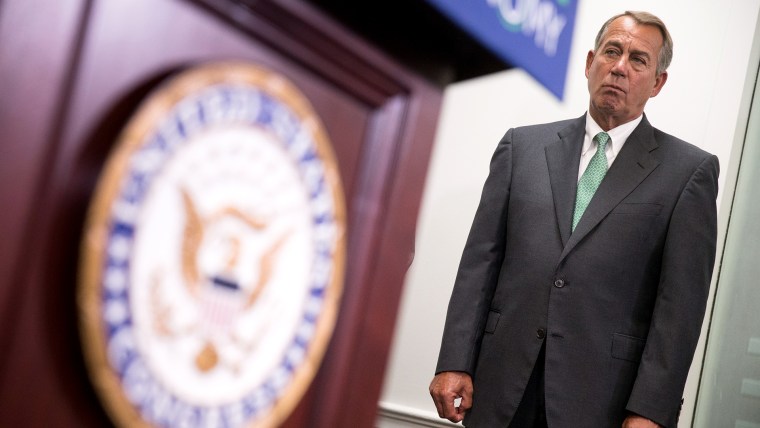After this afternoon's
drama in the U.S. House, Speaker John Boehner's (R-Ohio) office issued an
interesting statement, effectively saying, "Don't look at me."
House Speaker John Boehner (R-OH) today issued the following statement after the House failed to pass legislation reauthorizing the Trade Adjustment Assistance (TAA) program: "The outcome of today's TAA vote was disappointing. Republicans did our part, and we remain committed to free trade because it is critical to creating jobs and growing our economy. I'm pleased that a bipartisan House majority supported trade promotion authority. This is an opportunity for the Democratic Party to take stock and move forward in a constructive fashion on behalf of the American people."
The assertion that Boehner was disappointed by the TAA vote, but "Republicans did our part," stands out. Strictly speaking, it's not quite right.
Here's the roll call on today's vote on Trade Adjustment Assistance. Notice, 86 House Republicans voted for it, while 158 voted against it. Had the House GOP voted for the measure in greater numbers, "fast track" would be on its way to President Obama's desk for a signature right now.
And therein lies the point: Republicans didn't really do their part, so much as they voted for the part of the package they like (Trade Promotion Authority) and voted against the part of the package they don't like (Trade Adjustment Assistance).
Clearly, the principal focus today is on House Democrats,
and for good reason -- President Obama made a direct appeal to his ostensible allies today, and few of them were swayed.
But let's be clear about the broader dynamic: House Democrats are in the minority. In fact, it's the smallest Democratic minority in the chamber in generations, and it's not really up to them to decide what passes and what doesn't.
Over at Vox, Timothy B. Lee had
a good piece on this under-appreciated angle to the politics of the trade fight.
In principle, most Republicans are in favor of the president's trade agenda.... But most House Republicans weren't willing to spend the $450 million per year contemplated by the Senate bill on Trade Adjustment Assistance. That's why House Speaker John Boehner (R-OH) was forced to resort to a complicated scheme where Democrats would have to approve TAA while Republicans approved the rest of the bill. If you buy the arguments for the Trans-Pacific Partnership, which many Republicans profess to, this seems crazy. One influential study from the Peterson Institute estimated that the trade deal would generate $78 billion of economic benefits for the United States. Of course it's worth taking this kind of projection with a grain of salt. But even if we assume it's exaggerated by a factor of 10, the deal's benefits still dwarf the $450 million annual price tag of TAA.
And yet, Boehner barely tried to get TAA through his chamber today, and he mustered up just 86 votes.
In fairness, that's still more than double the number of Democratic votes the White House was able to secure, so it's not as if Obama is in a position to call up the Speaker and complain. For that matter, it's possible Boehner will pull together more votes early next week.
But as the dust settles on today's fight, and as Round II takes shape on Tuesday, let's not forget that Boehner is supposed to have great influence over what clears the House, and if he supports "fast track" as much as he claims, he can do some heavy lifting -- or at least try to.
Lee's report concluded, accurately, "[I]f the TPP collapses, they'll bear some of the blame."
